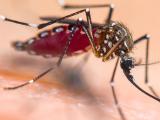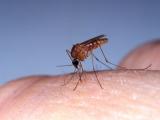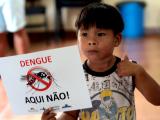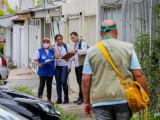Sep 7, 2012
Park Service: One hantavirus case-patient stayed in different part of Yosemite
One of the eight cases of hantavirus pulmonary syndrome (HPS) in Yosemite is not connected with a stay in Curry Village as the others are, the National Park Service (NPS) said today. The case-patient, who had a mild form of the disease and is recovering, stayed in multiple High Sierra Camps in a different part of Yosemite, the NPS said in an update. Three of the eight cases were fatal, with the other five patients "either improving or recovering," according to the update. "We want to make sure that visitors have clear information about this rare virus and understand the importance of early medical care," Yosemite Superintendent Don Neubacher said in the update. "We continue to work closely with state and national public health officials."
Sep 7 NPS update
In related news, French health officials are investigating two suspected HPS cases in French travelers to Yosemite, the European Centre for Disease Prevention and Control (ECDC) reported this week. "In France, the French National Institute for Public Health Surveillance has reported an ongoing investigation into two potentially exposed cases," the agency said in a report. It said 1,923 Europeans in 18 countries may have been exposed to the virus while visiting the park this summer.
Sep 5 ECDC report
ECDC reports possible locally acquired dengue in Greece
An 84-year-old Greek man died after a dengue virus infection that he may have acquired locally, the ECDC said in a news release today. The man had not traveled to a dengue-endemic country and had severe underlying conditions and septicemia, the agency said. Blood tests indicated dengue infection. The ECDC concluded, "Although it may never be fully established to what extent dengue contributed to the patient’s death, the laboratory test results clearly indicate an acute dengue virus infection. Introduction of dengue virus via infected travellers with subsequent local transmission is possible as demonstrated by the reports of local transmission in France and Croatia. The entomological investigation will provide further evidence of the presence of the Aedes albopictus mosquito in the area. Epidemiological investigations and serological surveys will provide information on whether dengue virus is circulating in the local population."
Sep 7 ECDC press release
Hedgehog pets linked to multistate Salmonella outbreak
Federal and state health officials are investigating a Salmonella Typhimurium outbreak linked to contact with pet hedgehogs that has so far sickened 14 people in six states, the US Centers for Disease Control and Prevention (CDC) said yesterday. The outbreak strain has rarely been seen in the past, and investigators are using PulseNet to identify other cases. Illnesses began from Dec 26, 2011, to Aug 13. States reporting cases are Alabama, Indiana, Michigan, Minnesota, Ohio, and Washington. Half of the patients are age 10 or younger, and of 10 patients with available information, 3 were hospitalized, but no deaths have been reported. All 10 patients who were interviewed had contact with hedgehogs or their environments, with some specifically mentioning African pygmy hedgehogs. The patients bought the animals from multiple breeders in different states. Two samples collected by health officials from where hedgehogs lived or bathed yielded the outbreak strain, the CDC said. The US Department of Agriculture (USDA) Animal and Plant Health Inspection Service is conducting trace-back investigations of outbreak-linked hedgehogs bought from USDA-licensed breeders. The CDC reminded hedgehog owners that they should wash their hands thoroughly with soap and water after handling the pets or anything in their environments. In 1994, the rare Salmonella Tilene subtype in a 10-month-old girl in the Seattle area was linked to exposure to African pygmy hedgehogs. Her family owned a breeding herd of the animals.
Sep 6 CDC outbreak announcement
June 1995 MMWR report
CDC reports limited supply of rabies vaccine
Rabies vaccine for pre-exposure use is in limited supply and available only from wholesale distributors, federal officials said today, adding, "At this time, there are no limitations in the supply of rabies immune globulin or vaccine for post-exposure prophylaxis." The two manufacturers of licensed rabies vaccine in the United States, Sanofi Pasteur and Novartis, are both unable to "directly supply rabies vaccine for pre-exposure vaccination," the Centers for Disease Control and Prevention (CDC) said in a news release. The agency did not specify the cause of the problem but said additional lots of the two vaccines are "expected to be released in the coming months." The CDC said rabies vaccine for pre-exposure use is available only from wholesale distributors who have stocks of Novartis's vaccine, RabAvert. The agency said, "Current supplies of RabAvert available through wholesale distributors are expected to be sufficient to meet demand for pre-exposure vaccination until additional lots are released. Persons at increased risk for rabies exposure should take appropriate precautions to avoid exposure."
Sep 7 CDC news release
Few Asian countries embrace rotavirus vaccination for children
Most Asian countries have not yet added the rotavirus vaccine to their national immunization program, despite the World Health Organization's (WHO's) advice to do so, according to a report today from IRIN, the news service of the UN Office for the Coordination of Humanitarian Affairs. Only two Asian countries, the Philippines and Thailand, are vaccinating or preparing to vaccinate children against rotavirus, WHO officials told IRIN. The Philippines started vaccinating children in July, and Thailand announced plans to launch rotavirus vaccinations but has yet to set a start date, the story said. The vaccine's cost is an important barrier to its use, the WHO said. Worldwide, 41 countries have added rotavirus vaccine to their programs, including four African nations: Botswana, Ghana, Rwanda, and Sudan. Rotavrius is the most common cause of severe diarrheal disease in young children, causing 500,000 deaths annually in those under age 5, according to the WHO. The agency has recommended the vaccine since 2009.
Sep 7 IRIN report




















